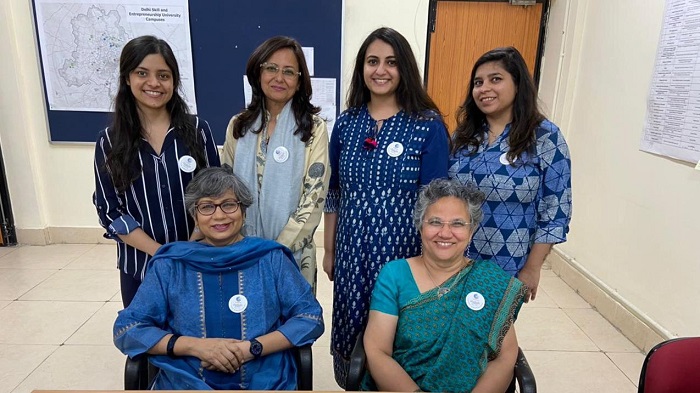
“Please don’t choose a vocational course, choose a vocation in life, that’s what is going to sustain you for long”, says Prof. Neharika Vohra, Vice-Chancellor, Delhi Skill and Entrepreneurship University (DSEU).
The first of its kind Delhi Skill and Entrepreneurship University (DSEU) is all set to begin its academic sessions this year. To learn about the vision for the university, how it is going to spearhead mindset change towards vocational higher education through skills and entrepreneurship, we interacted with Prof. Neharika Vohra, Vice-Chancellor, DSEU.
Read on to know more or you can also watch the video interview on our YouTube channel, for which the link is given below.
Q: What is your vision for the University? What are some of the issues you are trying to address as you get started?
A: Our vision is to bridge the gap between the fact that the industry needs skilled people and the students who need jobs or work. The vision, mission, and purpose of this university are to create courses that will actually skill people to make them job-ready from the day they step out of the university.
Q: How are you going to combine skills and entrepreneurship in a country where parents do not generally encourage it?
A: There are many nuances here:
- A large number of middle-class parents definitely want their children to have a secured and settled life which comes from having a job because at the end of the month you get a salary
- Traditionally, we’ve been a nation of traders, a nation of people with small businesses. So, it’s not like we are not entrepreneurial!
- There is a change that is coming along in a large number of people saying “at least once I would like to do a start-up, or build an enterprise”; here ‘once’ is a good starting point
If you look at entrepreneurship, it is not just about starting a business; it is about solving a problem in the context that you are operating in. I could be entrepreneurial in the job, or in the residential society, I live in, or in the university that I’m studying in. An entrepreneurial mindset is more important than just entrepreneurship.
Q: Formal entrepreneurship is a lot different from traditional businesses. Is skilling going to help in bridging this gap?
A: I do think so.
When we focus on skilling, we are saying I can use something that I know to actually create livelihoods and jobs. I’m doing it because I’m skilled at something that I possess to create a livelihood. This is where the link between skilling and entrepreneurship lies. We’ve decided that cutting across all courses, there will be a significant module on entrepreneurship and entrepreneurial mindset.
Q: How can we make it a cool thing to be a job creator?
A: There are certain courses we are designing at the university that will help people set up enterprises. For example, a course on Beauty Care is not just for working in a beauty parlor. This person, in his or her own environment, will create a small business. The courses at University will have a significant entrepreneurship component; how to incorporate a business, open a bank account, complying with GST, marketing, pricing, etc. Another course we are envisaging is ‘repair of household electrical appliances’.
So, every course will have a component on starting your own business. But, if we have 10000 students, I don’t think all of them will become entrepreneurs, that’s not our vision.
One of the programs that we are currently working on, is to identify 100 women for micro-businesses, support them, incubate, grow and mentor them for 18 months.

Q: How does a skill university distinguish itself from other training organizations?
A: Based on our research, in terms of talking to students, understanding skilling partners, one thing we’ve found is that lot of students want to have a degree. Whereas, on the other hand, a lot of skilling programmes are of short duration, which goes up to a maximum of one year.
They take a skilling course, then take up a degree and both don’t match. At the university, we have the unique opportunity of actually creating a degree around a skill.
Let’s say we want to create a group of people who can work in the Mental Health space, who could listen, counsel, provide geriatric care, etc. Rather than doing a B.A. in Psychology, we will offer a B.A. in Mental Health which will actually have the basics of Psychology along with the skill of helping people. There will be 60% focus on learning how to do the help work and 40% on the theory behind it. With this degree, you’ll be employable the day you step out since you have the skills.
It’s not just the academics who are developing the course. We are working with the industry to develop this course, understanding their need, skills, and attributes they look for in the candidates.
We also envisage, after three years the course may not be required, depending on the evaluation. We are also trying to create courses that are deeply involved with the industry, with internships and on-the-job training during the course.
It will be a contemporary course based on the needs of the industry; because we are a university that is getting formed in 2020, the year NEP was announced. We are, by design and by DNA saying that the course will have multiple entries and exits.
Q: What do you have to say about the quality of the programmes that will be offered at the university? Or is it too early to ask about it?
A: It is never early to talk about quality. It has to be a part of the DNA and quality comes from the mindset that we bring, the kind of expectations we set with the students. For example, securing 33% cannot ensure graduation. We will define a certain level of competence that you definitely need to have before you can get a certificate. The evaluation will be competence-based and continuous.
The university may not have a whole exam month. It will have exams every day, designed by the faculty. This is being built into the curriculum and assessment. And the faculty will have to embrace new ways of teaching and assessing in these courses.
Q: What is your plan of hiring the faculty at the university level, as this is happening for the first time in the country?
A: We will have 40% faculty who will meet the UGC criteria and 60% faculty will be professors of practice who would have significant industry experience. The faculty will be on a five-year contractual basis, which means after five years, if the courses run, the faculty will stay.
Also read: 10 points to consider: Vocational education and skills in National Education Policy 2020 – https://nationalskillsnetwork.in/10-points-to-consider-vocational-education-and-skills-in-national-education-policy-2020/
Q: How do you perceive the equation between skilling and placements?
A: I believe education should lead to employability. To become employable, the youth have to learn technical skills and employability skills or ‘face-the-world’ skills as we call them.
If you have constantly interacted with the industry, and your learning is applied and thorough, then why would the industry not hire you?
Let us focus on preparing the students at a level where they will be placeable. Invest in the design of the learning process, get the industry to experience the candidates while they are learning, invest in their growth and obviously, you will find a job. And of course, the onus lies with the students also.
Q: Could you give us details about the courses that will be offered and from when the sessions would start?
A: We hope to announce our admissions in May 2021 and run at least 10 courses. All the courses will be leading to a degree in areas like Web Design, Beauty, Early Education, Mental Health, BFSI, Hygiene Management in the WASH sector, Digital Marketing, Hospitality, Food Production, and Safety, Paramedical services, E-commerce, etc. We are looking at a wide range of areas and are working with some of the best industry partners to develop the curriculum. We hope that the students of Delhi will find it exciting. Our courses will be across Delhi through a distributed campus.
At last, I would like to convey to students that, please don’t choose a vocational course, choose a vocation in life, that’s what is going to sustain you for long.





